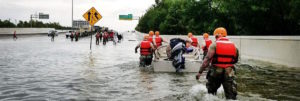Offshore Injury
Offshore Injuries – Hurt at Sea
Working offshore can mean more money in exchange for a higher-risk job. It is a specialized location for employment that has specialized laws that apply.
General maritime law is the umbrella under which people involved in accidents on United States navigable waterways, the Gulf of Mexico and at sea make legal claims. Covered workers include seamen and employees injured in oil and gas platform accidents on rigs not permanently affixed to the ocean floor.
The Jones Act, Longshore and Harborworkers Compensation Act and Death on the High Seas Act are some of the most widely applied statutes under the maritime umbrella. When filing a lawsuit, workers typically make a general maritime claim as well as a claim under the specific statute.
Chad Pinkerton has recovered over $200 million* on behalf of victims of maritime and industrial accidents since 2006.
The Law Concerning Offshore Injuries
The Jones Act is a federal statute that covers employees of shipping vessels when they are injured on US waterways and between ports because of the negligence of another; primarily, ship owners, shipmates and ship captains. The statute confers jurisdiction to federal district courts for claims for injuries sustained by ship or vessel workers traveling on oceans and intra-coastal waterways. Divers are covered as well.
A lawsuit under this Act will attribute fault to each party, including the plaintiff, as applicable, and will apply damages based on how fault is distributed. Under this Act, workers are entitled to maintenance and cure monies, which cover costs involved in the event of an employee’s illness. The statute of limitations for this Act is three years from the date of injury.
The Longshore and Harborworkers Compensation Act is a law that provides compensation, medical care and vocational rehabilitation services for longshore workers, ship builders, ship repairers, or harbor construction workers. Injuries covered must have occurred on US navigable waterways or adjoining areas like piers, docks and terminals.
The Death on the High Seas Act provides compensation for the family of those who died while at sea. Damages include not only financial losses but for pain and suffering as well. Generally this law is applicable only if the person died at sea as opposed to being injured at sea and dying sometime later, although there are some exceptions to this. The statute of limitations for an action under this Act is three years from the date of death.
Money Damages from Offshore Injuries
Financial recovery can include present and future medical bills. Other potential areas of compensation, depending on the facts of the situation, are mental pain and suffering damages, lost past and future wages, permanent impairment/disfigurement, punitive damages, wrongful death damages and loss of enjoyment of life. Maintenance and cure damages are payments for room and board and medical costs resulting from illness of an employee.










